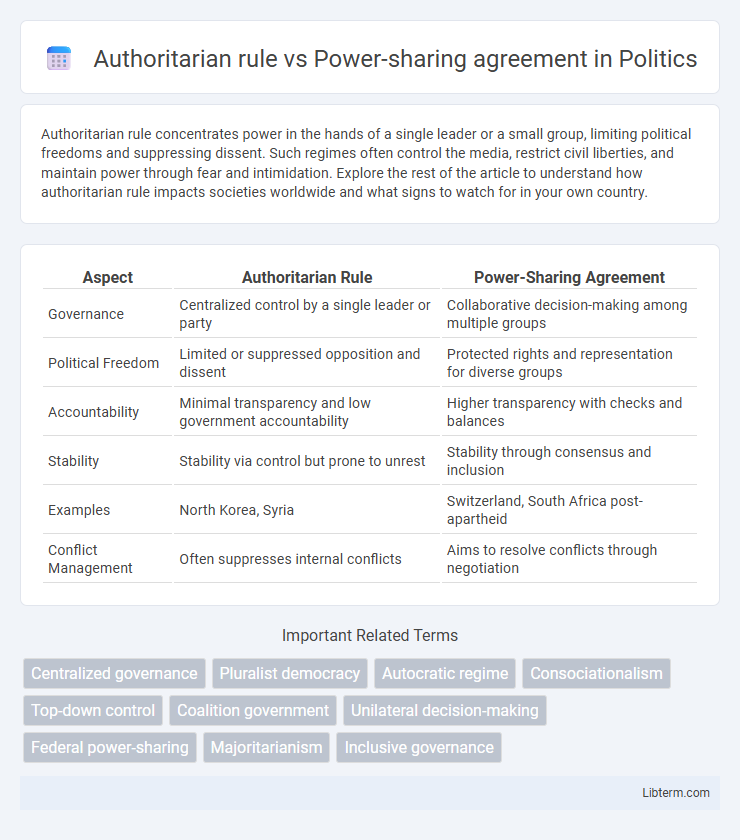Authoritarian rule concentrates power in the hands of a single leader or a small group, limiting political freedoms and suppressing dissent. Such regimes often control the media, restrict civil liberties, and maintain power through fear and intimidation. Explore the rest of the article to understand how authoritarian rule impacts societies worldwide and what signs to watch for in your own country.
Table of Comparison
| Aspect | Authoritarian Rule | Power-Sharing Agreement |
|---|---|---|
| Governance | Centralized control by a single leader or party | Collaborative decision-making among multiple groups |
| Political Freedom | Limited or suppressed opposition and dissent | Protected rights and representation for diverse groups |
| Accountability | Minimal transparency and low government accountability | Higher transparency with checks and balances |
| Stability | Stability via control but prone to unrest | Stability through consensus and inclusion |
| Examples | North Korea, Syria | Switzerland, South Africa post-apartheid |
| Conflict Management | Often suppresses internal conflicts | Aims to resolve conflicts through negotiation |
Defining Authoritarian Rule and Power-Sharing Agreements
Authoritarian rule is characterized by concentrated political power in a single leader or a small elite, often accompanied by limited political freedoms and restricted civil liberties. Power-sharing agreements involve the distribution of political authority among diverse groups or parties, aiming to foster cooperation, reduce conflict, and promote inclusive governance. Defining these concepts highlights that authoritarianism centralizes control and suppresses dissent, whereas power-sharing embraces pluralism and collaborative decision-making.
Historical Contexts: Case Studies of Each Model
Authoritarian rule in historical contexts often emerged in post-colonial states such as Zimbabwe under Robert Mugabe, where centralized power suppressed opposition to maintain control. In contrast, power-sharing agreements like the 1994 South African Interim Constitution institutionalized political inclusion to manage ethnic divisions after apartheid. These case studies highlight the divergent outcomes of governance models in promoting stability or perpetuating conflict.
Key Characteristics and Mechanisms
Authoritarian rule centralizes political power in the hands of a single leader or a dominant party, utilizing mechanisms such as repression, censorship, and limited political pluralism to maintain control. Power-sharing agreements distribute authority among multiple groups or factions, often institutionalizing cooperation through mechanisms like coalition governments, proportional representation, and inclusive decision-making processes. These contrasting frameworks shape governance dynamics, with authoritarian regimes emphasizing control and stability, while power-sharing systems prioritize conflict resolution and representation.
Impacts on Governance and Political Stability
Authoritarian rule often leads to centralized decision-making, resulting in limited political pluralism and increased risks of governance inefficiencies and corruption. Power-sharing agreements promote inclusive governance by distributing authority among diverse groups, enhancing political stability through consensus-building and reducing the likelihood of conflict. Empirical studies demonstrate that countries with power-sharing arrangements tend to experience greater institutional resilience and sustained peace compared to those under authoritarian regimes.
Effects on Civil Liberties and Human Rights
Authoritarian rule typically results in the suppression of civil liberties and widespread human rights abuses due to concentrated power and lack of accountability. Power-sharing agreements often promote greater protection of civil rights by distributing authority among diverse groups, fostering political inclusion, and reducing the risk of authoritarian excesses. Empirical studies highlight that societies with power-sharing frameworks experience enhanced freedom of expression, assembly, and legal safeguards compared to authoritarian regimes.
Economic Outcomes: Authoritarianism vs. Power-Sharing
Authoritarian rule often centralizes decision-making power, enabling swift economic policy implementation but risking inefficiency due to lack of checks and balances and potential for corruption. Power-sharing agreements, by distributing authority among diverse groups, can enhance stability and inclusiveness, fostering broad-based economic growth and reducing conflict-related disruptions. Empirical studies show that countries with effective power-sharing mechanisms tend to experience more sustainable development and higher foreign investment levels compared to authoritarian regimes.
Managing Ethnic and Social Diversity
Authoritarian rule often suppresses ethnic and social diversity by centralizing power and limiting minority participation, leading to potential marginalization and conflict. Power-sharing agreements distribute political authority among diverse groups, promoting inclusiveness and reducing tensions by ensuring representation in governance structures. Effective management of ethnic and social diversity is achieved through power-sharing mechanisms that foster cooperation and stability in plural societies.
International Relations and Global Perceptions
Authoritarian rule often leads to centralized decision-making and limited political pluralism, which can result in international isolation and negative global perceptions due to concerns over human rights and democratic deficits. Power-sharing agreements promote inclusive governance and political stability by distributing authority among diverse groups, enhancing a state's legitimacy and fostering positive diplomatic relations. In international relations, power-sharing frameworks are frequently seen as mechanisms to mitigate conflict and build cooperative ties, whereas authoritarian regimes may face sanctions and strained alliances.
Challenges and Risks in Implementation
Authoritarian rule often faces challenges in implementation due to concentrated power leading to limited political pluralism, suppression of dissent, and increased risk of civil unrest. Power-sharing agreements encounter risks such as factionalism, distrust among parties, and difficulties in maintaining stable governance amid competing interests. Both systems can experience legitimacy crises and governance inefficiencies if mechanisms for accountability and conflict resolution are weak or absent.
Future Trends: Evolving Models of Governance
Future trends in governance reveal a shift from rigid authoritarian rule toward more inclusive power-sharing agreements that enhance political stability and citizen participation. Emerging hybrid models combine centralized authority with negotiated power distribution among diverse groups, fostering conflict resolution and sustainable development. Advances in digital governance and international diplomacy further support the evolution of adaptable frameworks balancing control and collaboration in complex political landscapes.
Authoritarian rule Infographic

 libterm.com
libterm.com